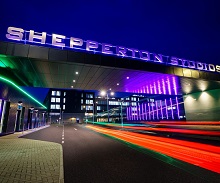Pinewood: "The UK has been capacity constrained"
Eighteen months ago Pinewood Studios secured planning permission to practically double the size of the complex.
Buoyed by a healthy market for filmmaking facilities, the company is currently on course to open a further five sound stages early next year.
Pinewood's communications director Andrew Smith is clear on the reason for this success. "If you abolish tax incentives the UK film industry would contract by 71% overnight,"Â he says, emphasising that film tax relief is not a party political issue.
"It was devised by Gordon Brown, and it was adopted and enhanced by [subsequent] governments, including the Conservative government. And it has also developed into other creative sectors such as animation, video games and high-end TV."
Â

Smith admits that the UK is expensive, but also contends that the tax relief, skilled crew and world-class facilities are major selling points.
Planning problems dogged the upgrade project for a long time but were finally resolved last year. The studios' current development work is part of a £200m redevelopment which will eventually include ten new stages built on both existing land and brownfield sites, with expansion constrained around protected green belt land. An exemption to these restrictions was made by then-Communities Secretary Eric Pickles in June 2014.
The approved developments have been considerably downgraded from the ambitious ideas of the previous Project Pinewood. Plans for a significant amount of housing were dropped in 2012, as were extensive backlot facilities that would have offered standing sets representing in-demand international locations.
Pickles approved the revised plans on the basis of long-term economic benefits, despite stubborn resistance from local government.
Pinewood has long been associated with big-budget international productions, but the studio has also been an investor in local shoots without direct links to Hollywood.
Â

Smith refers to director Amma Asante's 2013 film Belle, where the studio was credited as Pinewood Pictures for their contribution to the film's $10m budget, and to Owen Harris' Kill Your Friends, which was due to be screened at Pinewood on the very day of this discussion.
"There was a young guy who was working on 24: Live Another Day and Belle"Â Smith explains. "We should always see it as one industry, though there are different challenges."
Confronted with the conventional counter-argument that tax relief simply represents governments buying work for their citizens, at those citizens' expense, Smith notes that the deal is, overall, very worthwhile for the taxpayer.
"Every £1 out of the treasury gets £12 back. The benefits of tax relief are well understood by government," he says. Under these circumstances the recent spike in business, and the resulting inclination to expand, is understandable.
"The need for additional facilities is demand-led,"Â says Smith. "The UK has been capacity constrained. If you looked at the BFI figures for 2014, you will find that it was the highest year on record for the UK."
Pinewood's current expansion plans represent an increase in scale of over 60% just in terms of the number of available stages, and Smith is keen to emphasise the key importance of government help, and from across the party political divide. "I think we're very fortunate, as an industry to have the support of successive governments."
Â
Also on The Knowledge
New studio launched in south-west London
A new studio has been launched in south-west London by Simon Vaughan and Damian Keogh, British TV producers and co-founders of The Story Collective.
Major new studio planned for Scotland
A major new studio has been greenlit for Scotland with partial funding from the UK government.
Steven Knight drama showcases West Midlands locations
Steven Knight’s new 1980s-set drama, This Town, filmed at Digbeth Loc. Studios and on locations around the West Midlands.
Blankety Blank wins two more series
Thames has greenlit two more series of revamped game show Blankety Blank for delivery to BBC One.
Peaky Blinders film to shoot in September
Peaky Blinders creator Steven Knight has confirmed that the film version of the period drama is eyeing a September start.
Shepperton expansion opens as Amazon MGM and Netflix move in
The major new expansion of Shepperton Studios is now open with the third series of Prime Video’s The Devil’s Hour now filming.




























